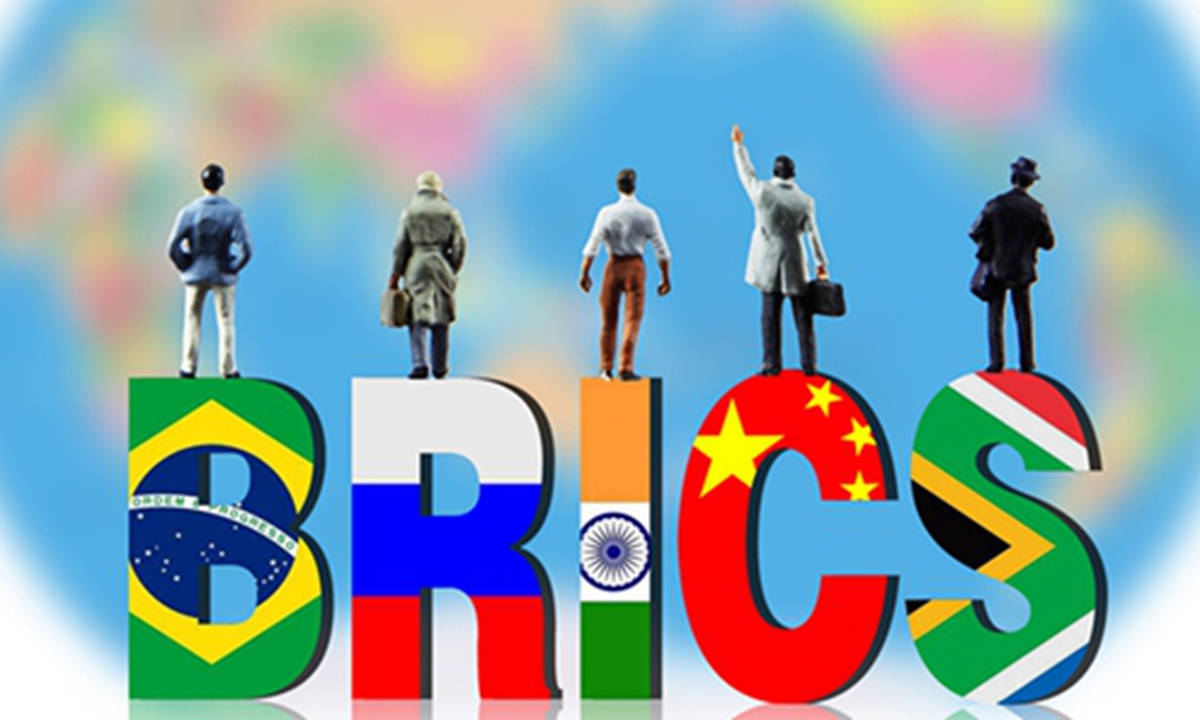
BRICS Photo: VCG
The 14th BRICS Summit held on June 23 and 24 issued the Beijing Declaration, in which BRICS countries reiterate their commitment to multilateralism, emphasize that global governance should be made more inclusive, representative and participatory, and vow to uphold international law and the central role of the United Nations in the international system. The Declaration also urges major developed countries to adopt responsible economic policies while managing policy spillovers to avoid severe impacts on developing countries. When the world's development has entered a new period of turbulent changes, the issuance of the Beijing Declaration is of special significance.
Unsurprisingly, the successful BRICS Summit with China holding the rotating presidency has sparked some twisted interpretations in the US and Western public opinion. It's worth noting that their main attention has been paid to driving a wedge among BRICS countries. In particular, they did a lot of work trying to stir India up. It is very likely that the outbreak of the Russia-Ukraine conflict and the pandemic have made them think they could have a chance to sow discord among BRICS countries. However, BRICS states haven't gone ahead as they designed, let alone to be misled or divided.
The Beijing Declaration that represents the consensus of the BRICS countries is the clearest proof. The document mentioned "development" 89 times and "cooperation" 105 times. As Chinese President Xi Jinping pointed out in his important speech, "BRICS countries gather not in a closed club or an exclusive circle, but a big family of mutual support and a partnership for win-win cooperation." The messages conveyed by the BRICS Summit is worthy of careful reading by the international community, especially the US and Western countries. If they do so, it is believed that it will deepen and enhance their understanding of the BRICS countries, the emerging markets represented by the BRICS group, as well as the developing nations, and to correct their prejudices. It's a process in which the Western world and non-Western world strengthen communication rather than confrontation.
Coincidentally, at approximately the same time as the BRICS Summit, Western countries will convene three important summits in succession, namely the EU Summit, the G7 Summit and the NATO Summit. The latter two attended and led by the US stand particularly in stark contrast to the BRICS Summit. We can see two distinct global governance propositions. The US and the West are forming small circles, building walls and establishing hierarchical camps, while emerging and developing countries are actively advocating the practice of genuine multilateralism, openness and inclusiveness, as well as cooperation and win-win results. An old-fashioned proposition is in a tug-of-war with a new suggestion, and the future destiny of mankind depends to a large extent on the outcome of this historic race.
The BRICS mechanism that upholds the spirit of "openness, inclusiveness, and win-win cooperation" is true multilateralism. The five BRICS countries come from all over the world, and the "BRICS Plus" cooperation also includes the APEC and G20 host countries this year. The BRICS mechanism covers a wide range of views on international affairs of countries in different regions and different stages of development. It is worth mentioning that the BRICS countries have established a consultation mechanism on the Middle East issue. The Beijing Declaration also comes up with constructive solutions to issues including Afghanistan, Iran and North Korea, which have been widely recognized by regional countries.
Today, the US also claims that it engages in "multilateralism." But in the mechanisms established by the US, although it seems that there are many parties involved, the US is the only dominant force. Relying on its strength and position, the US totally dominates the formulation of institutional rules, and the US' rules are the paramount rules in its small circle. Some US media claimed that the G7 Summit and NATO Summit this time will form "unprecedented unity" on "major challenges," and safeguard "the US-centered Western democratic camp." These words seem to bring people back to the Cold War era.
It is not surprising that in the US and Western public opinion, some narrow-mindedly believe that the BRICS mechanism wants to create an "anti-US alliance." This is not only a deliberate trap of wording, but is also creating an "imaginary enemy." In order to maintain absolute obedience within the small circle, the US inevitably needs to constantly seek and create enemies. However, as it increasingly deviates from global common interests, the small circle's ability to dominate international issues will inevitably continue to decline. The rest of the world will view these dangerous small circles with anxiety.
The world has once again come to the crossroads. Peace or war? Development or decline? Opening up or closing? Cooperation or confrontation? These questions are thought-provoking. For a turbulent world full of challenges, the BRICS Summit is a surprise. We hope that the upcoming G7 Summit and NATO Summit will not startle the world. We have a suggestion: The G7 Summit may just as well carefully read the 14th BRICS Summit Beijing Declaration, and it will definitely be rewarding.




